
 by
Lynn Salmon, Spring 1991
by
Lynn Salmon, Spring 1991
 by
Lynn Salmon, Spring 1991
by
Lynn Salmon, Spring 1991I spent the months of April through June, 1991 working and travelling in China, and the following is an edited version of the journal I kept while I was there. I spent the first month working on an air pollution study in Yungang Grottoes. The Yungang Grottoes near Datong in the People's Republic of China are located in a region with severe air pollution problems. The Grottoes contain about 50,000 carvings on the walls and ceilings dating back to the 5th century A.D., and efforts to preserve or restore the sculptures from assault by abrasive and possibly chemically reactive airborne contaminants is underway.
After working for a month, I was joined by my husband, John, and we set off heading west along the "silk road" until we reached Pakistan. We ended our trip by travelling down along the Karakoram Highway and flying home from Lahore. Total expenses (excluding airfare) for two people for two months travelling was approximately $2500, though we were travelling fairly expensively, staying in nice hotels, eating expensively, taking soft sleeper trains, etc., and one could do it for far less, or far more depending on your tastes. Airfares one-way LA to Beijing were $700 and return one-way Lahore to LA another $1100. The exchange rates were $1 = 5.3 Yuan in China, and $1 = 24 Rupees in Pakistan.
We arrived in Beijing on the morning of May 6 and checked into the 'ole Capital Hotel; different room, same bathroom problems. The first order of business was getting a Visa extension since I was only able to get a 30 day Chinese Visa before I left the US. Christos also needed to get a new Visa to get back into the US. The Bureau, trying to be helpful, gave us a car and Mr. Li for the day to help us sightsee or whatever we wanted to do since we were officially their guests for 3 more days and they had to keep a watchful eye over us.
Unfortunately, we weren't easily able to communicate to Mr. Li what a Visa was or why we needed one. He got the message that we were planning to stay and travel in China and wanted to take us to CITS or other travel agencies. Okay, let's try the US Embassy for Christos' needs, but they only accept applications in the morning so we went back to extending our Chinese Visas again.
This turned into our first taste of Chinese bureaucracy, but was fortunately the only place in our trip that we had any troubles. We finally convinced Mr. Li that we didn't want to arrange a trip to Xi'an and persuaded him to direct the driver to go to the PSB (Public Security Bureau) which our guidebook says is the place to get Visa extensions. It is the right place and we got an application, however, we have business Visas and they can only be extended with approval of the Bureau we are working for and we are told we need a letter from them. We then proceeded to the Bureau of Cultural Relics to ask for a letter. This part was kind of fun because we got to drive around at high speed through a portion of the forbidden city to get to the office. Unfortunately, the Bureau says no to our request because they don't want to be responsible for us travelling in China. They keep insisting that travel in China is too difficult for individuals and we really must sign up with a tour operator and they direct Mr. Li to take us to CITS. Fortunately, it is late afternoon by now and we put Mr. Li off until tomorrow since we have no intention of taking a tour.
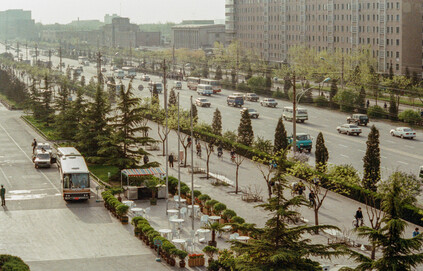
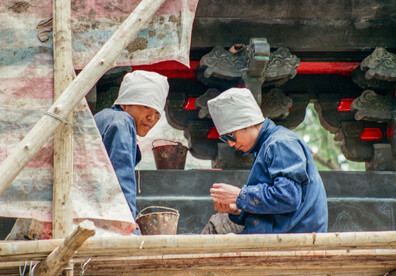
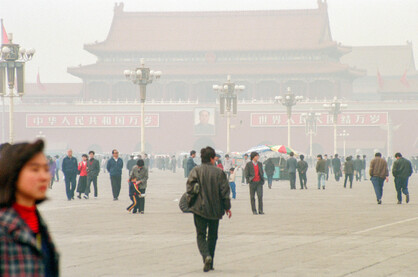
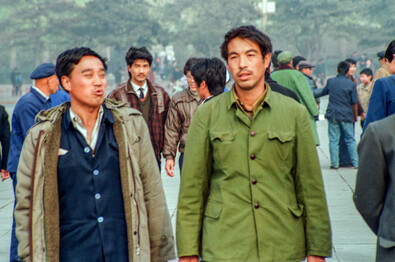
We manage to send Mr. Li off without us in the morning by having him go with Christos to the US Embassy. We then traipsed around the city trying to work on our Visa extensions. First we tried applying for new tourist Visas, however, this can not be done from inside the country. We then, for a small fee, got a letter from a travel agent requesting that our Visas be extended for 30 days. Fortunately, the PSB officer interpreted the letter and decided we were in the travel business and we got our extensions. The fact that my original Visa had expired two days ago didn't matter as I feared it might.
The Bureau kept insisting that travel in China is not easy and wanted to make sure we were taken care of properly. We kept being kind of vague about our plans and thanking them for their concern and they finally dropped the subject since we weren't their responsibility after May 9th. We were treated to a formal banquet on May 8 which was a disappointment compared with some of the meals we got in Yungang. There were about 8 dishes, all of them edible, but nothing outstanding. We had a goofy plastic lobster center piece that the Chinese at our table made fun of during the meal, and so did we. Also a guest at this banquet was the cultural attache from the US Embassy, a guy with an Irish name and an Australian wife who were very encouraging about our travel plans, having had a lovely trip themselves.
Christos spent most of his time in Beijing worrying about getting his US Visa in order, the US bureaucracy turning out to be worse than the Chinese. He even missed out on our trip to the Great Wall which the Bureau arranged for our last day. John and I "climed the Great Wall" no "b's" allowed. Seriously, we must have seen the word "climb" a hundred times throughout China and every time it was spelled "clime." We took Mr. Li along who was fun as usual.
The Great Wall is wall-to-wall people up until the fourth tower where they all mysteriously turn around and head back. There were no signs prohibiting continuing along so we kept walking for a little way. We apparently could have continued on for some distance and it's a very pleasant place to walk after you get past the crowds.

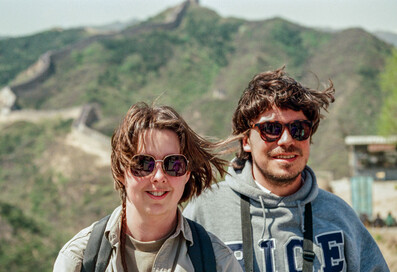



We finally escaped the protective clutches of the Bureau on May 9 and moved ourselves from the Capital Hotel to the Xinqiao Hotel. The Xinqiao is far superior, not to mention about 1/3 the price of the Capital Hotel $35 vs. $110 for a double. The Xinqiao is also very centrally located being on most of the city bus routes as well as across the street from a subway terminal. Our passports are now at the Pakistani Embassy getting a Visa for there. We will get them back on Monday and we have arranged a flight out of Beijing on Tuesday going to Luoyang.
We've now experienced the full range of transportations available in Beijing. Buses have proved to be a good way to get around and only cost 1 or 2 Mao (1 Yuan = 10 Mao) depending on whether you get a green one or a red one. They are a little crowded and there is some pushing and shoving but they don't come near the horror description given of them in the Lonely Planet Guidebook for China, but then Lonely Planet Book, as we learn throughout our trip is generally off when it comes to China, though we have had success with their India and Nepal and later the KKH guidebooks. Buses seem to run up and down every street and they are so cheap you can just get on one going the direction you want and get off if it turns off and get on another one. We've also tried the subway which goes around the city in a big loop. It's a good way to go if you are going to one of the places on the loop with a flat fee of 0.5 Yuan. Taxis cost 12 Yuan for the first 4 km and 3 Y/km after that.
Yesterday and today we finally did a little more touring and less Visa and travel ticket arranging. We went to the Chinese History Museum, which is very large. If we could read Chinese we could have spent a very long time in there. However, the collection is arranged chronologically and it gives a good sense of the progression of tools and crafts from stone-age to modern day even if one is unable to read the descriptions. Some of the maps clearly showed invasions or trade routes, so we found it quite enjoyable to piece together what we were looking at for ourselves. The museum was also pleasantly uncrowded.
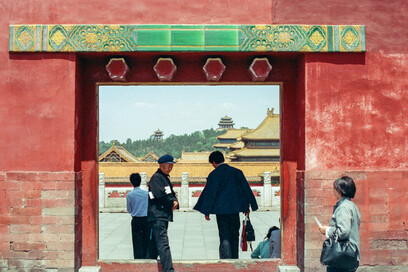
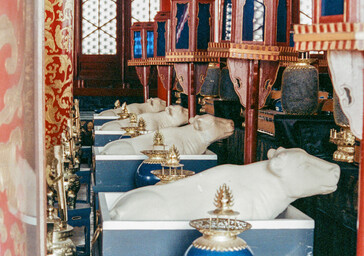
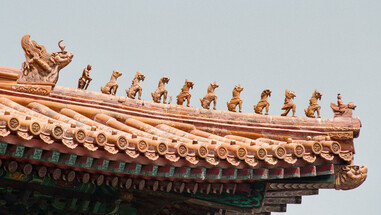
The Forbidden City, on the other hand, was packed. In real life it looks just like it does in the movie, "The Last Emperor", and one must go there, but it was extremely crowded with Chinese tourists, and most of our time was spent shoving our way through the crowds to try and get a brief glimpse into the various rooms. The place is also in some disrepair, except for the roofs which are beautiful. There are lots of courtyards and rooms where a bunch of people crowd up and push and shove to peer into a room with period furniture and then hurry off to crowd up at the next window, and so on.
We went out the rear entrance across from coal hill park (Jing Shan Gong Yuan). Supposedly the hill was formed when they dug the moat for the Forbidden City and they needed to pile the dirt somewhere. Now it's the highest point in the city, and when the air pollution is not too bad it affords a good view. Ah, just like being at home in Pasadena. Beijing has changed tremendously in appearance from when I first arrived 5 weeks ago. The weather has gone from that stage at the end of winter when the snow is gone but things are still gray and dull to the beautiful full bloom of spring. It's also raining little white plant thingies all over the city. Good thing I don't have hay fever.
On Wusi Street we found and photographed a billboard for CAAC (China Airlines). Their symbol seems to be the Phoenix. Am I missing something here? If you were an airline executive would you choose as your corporate logo a bird that crashes in flames? From here, we took another bus toward the Lama Temple (Yong He Gong). We met a guy on the bus who spoke English and he directed us to where to get off for the subway and told us to take it east one stop. We did and found the Lama Temple. The Lama Temple was much pleasanter than the Forbidden City and much better kept up as well. We sat in one of the courtyards for a while and ate some oranges we got from a street stall outside.
While we have been eating well and finding good food in Beijing, we still haven't figured out exactly how one is supposed to do it. Street vendors are no problem, you pick up what you want, they say a price, which I even understand a lot of the time, pay and off you go. Markets are the same, but restaurants, who knows. We've had a lot of good meals at the top end hotel dining rooms which serve very good food, have menus with English, and behave like restaurants we are used to. These run about 60 Yuan for three ample dishes and rice and tea. Cheap by Western standards, but expensive for China, and we feel we are insulated from the "real" China.
Last night we tried one of the recommendations in the Lonely Planet guide, a place called the Small Duck or Bianyefang. We went in at about 6:30pm which we believe may be a little late for dinner. We went up to two apparent hostesses, indicated we were a party of 2. They shook their heads. We stood around, then three French tourists came in and tried the same with the same results. The French headed off to a side room and we followed. All of us stood around looking a bit lost and then we teamed up and asked for a table for 5. We were told it was too late to be seated, though I had witnessed a Chinese couple come in and make room for themselves at a large table others were at. This required conversing and asking for a place setting and getting a waitresses attention on their part.
The 5 of us then went back out to the hostesses and said we are 5 and this time they took us to yet another room with some empty big tables and seated us. We tried to do some ordering with the menu and got a lot of "mei you's" (pronounced like mayo and meaning anything from don't have, never have had, don't have right now, or don't feel like getting). We then got up and pointed at stuff on other tables which worked fine. The food was very good in the end. We had 1.5 Beijing ducks, a chicken dish, a plate of scallops, and a vegetable dish and there was food left over when we were finished eating. Five people well fed (including beverages) for 115 Yuan.
We got off to a late start today, but we're on vacation after all. We took the subway to the zoo station (Xizhimen). We got on one station before the shopping district and there was a lot of pushing and shoving. Most people got off at the next stop and we got seats before the other hoards pushed their way on. It's pretty amusing, people scrambling for seats, but it was fairly congenial, no fighting, no knocking over old women or children. We got out after 8 stations and took a bus the rest of the way to the Summer Palace after deciding to pass on the zoo because it was a "zoo." Today is Sunday, people's one day off per week and a chance to bring the family to the zoo or generally go to most of the places we might want to go to as well.
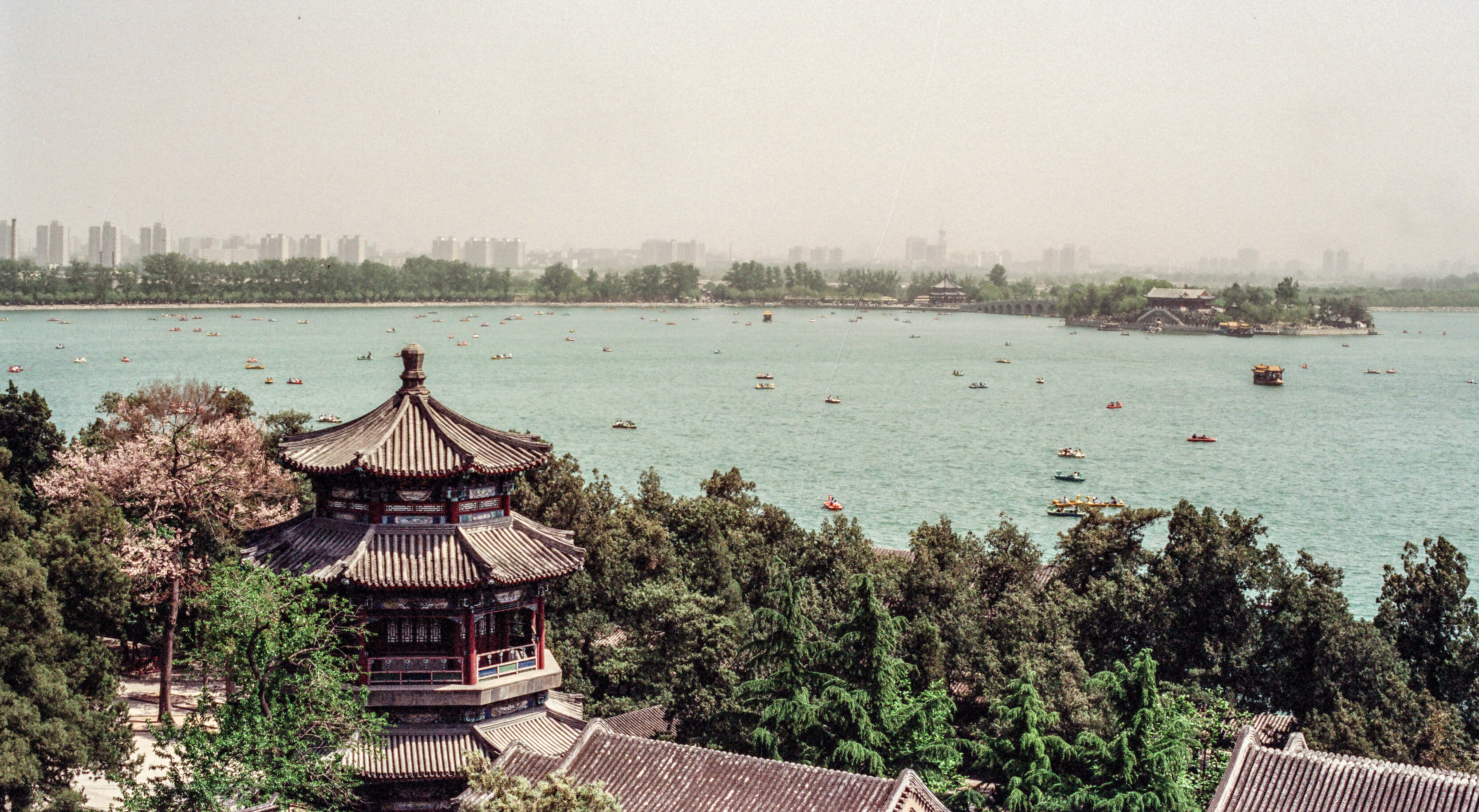
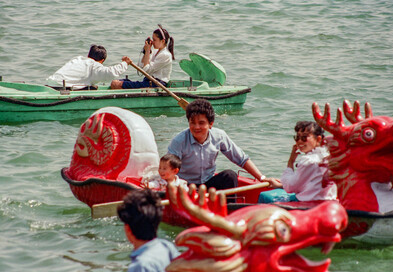
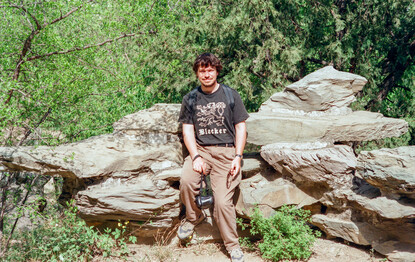
Despite the crowds, we got seats on the bus and made it to the Summer Palace. The Summer Palace was also extremely crowded, but was otherwise very nice, better than the Forbidden City for strolling around, more spread out with a lake with a pleasant breeze. Plus it had an infinite corridor like MIT :-).
When we were ready to leave it was ~4:30pm and everyone else was also ready to leave. There were so many people waiting for buses that we decided to take a cab. So it cost 72Y to return compared to 1.8Y to get there. We had the cab drop us off at one of the Friendship stores and ran into our French dining companions from the other night.
We managed dinner for two at the small duck. It was only mildly confusing and we had a good meal. We got 1/2 duck, no problem, but then tried to order something from the menu that they didn't have. We were able to point to the word vegetable in our dictionary and got a good mix of asparagus and Chinese greens in a duck sauce. The duck soup was very good tonight, too. There was also a small Chinese child at the next table making faces at us. He was pulling at his eyes doing a "round eye" imitation that was kind of cute. The adults at his table had their shirts off because it was pretty hot in the restaurant. It went well with the general ambiance of the place.
The next morning, we started our day by looking for a cab to take us to the Pakistani Embassy but none could be found at 8:30am. Maybe the large group of Egyptians who are partying down on our floor took them all away.
We took the subway followed by a bus and got to the embassy, where our passports were waiting with Visas (no charge). I've got the wrist motion down for the subway ticket takers, too. You purchase a ticket at the "Booking Office," take it through a gate where the ticket taker grabs one end and pulls expecting you to hold on to your end with the desired result being each of you getting half. What my half is good for, I don't know, but one ends up with a million little bits of paper from the subways, buses, admission stubs, etc.
Passports in hand we headed off for a nice lunch at the Japanese restaurant in the Capital Hotel, the only feature of the Capital worth recommending. We then took a bus via the United Airlines office to change the date of my return ticket, followed by the subway to the zoo. Overall, the zoo was only fair, though it had one of the better Panda viewing areas I've seen. The Pandas have their own large structure with several pleasantly laid out rooms for the pandas. The admission of 2 Yuan is twice the 1 Yuan admission to the rest of the zoo. This meant there were about 10 people viewing the three pandas.
We ate dinner at the Moscow restaurant recommended in LP. They were correct about the borscht being very good and dinner for 2 with 2 soups, 2 entrees and beer came to 26 Yuan. We took the subway back to the hotel, stopping off at Minims for chocolate cake for dessert which at 16Y was almost as much as dinner, but was good. We're packed up and will be off to Luoyang in the morning on CAAC.
We took a cab to the airport and passed around the security checkpoint into the CAAC loading area. Most other people were waiting in a horde to pass their bags through the x-ray machine, but we walked behind and straight in and no one said anything. There was a later x-ray point as well but they were more concerned with looking at my passport than by my setting off the metal detector which didn't get a second look. The flight to Luoyang was on a propeller plane but left on time and had no hitches. We didn't check any bags.
We weren't sure quite what to do when we arrived in Luoyang but there was a bus and 3 taxis waiting outside the airport so we got on the bus. It took us into town for 2Y and we showed the driver the map of Luoyang from Lonely Planet and pointed to the Friendship Guest House and he took us there. The Luoyang map is one of the few where LP includes a list of places in Chinese characters, without them maps are pretty useless. The Lonely Planet China maps in general proved to be grossly inaccurate and didn't provide any distance scales so were not of much use. This wasn't the case with some of their other guidebooks that we've used in the past, but they really botched the China guide.
The Friendship Guest House is a typical western style hotel for 150Y a night. The desk staff spoke English, and we asked where we should go to get a train ticket to Xi'an. They said give us 150Y (75 each) and passports and they'll get them by tomorrow morning. Seems easy enough.
It was late afternoon, but we had time to visit the Luoyang Museum. This Museum is a small version of the museum in Beijing though it concentrates on Luoyang instead of all China. We saw some more of the artifacts that we can't quite identify but feel we should. They look like either part of a weapon or a farm implement and there were many of them in Beijing. We wrote down its Chinese characters for future reference when we get to a dictionary. We also saw some more of the musical instruments that remind me of a whale skeleton.
We walked back to the hotel past a bigger, fancier, newer hotel called the Peony. We looked in and took advantage of the air conditioning in the lobby to cool off before walking back to our hotel. We got a simple dinner at our hotel, 3 dishes and rice. Afterwards we looked out our window and saw some people exercising in the park across the street. So we took a stroll to watch, plenty of other people were strolling and watching, as well, and kids were doing acrobatics.
Three young English speaking Chinese men stopped to chat with us. They studied English when in university. One now works at a ball bearing factory and the others at the Luoyang Tractor Factory (formerly called the East is Red Tractor Factory.) One of them was very puzzled by an English text he had had in school which sounded like reprints of newspaper articles including Dear Abby columns. He couldn't understand why anyone would write to a newspaper with their problems instead of asking a family member. We tried to explain it as a desire for anonymity, but he still thought it was a really weird concept.
We mentioned we were from LA and they all enthusiastically said, "The
Lakers are the best basketball team in the world!" and rattled off
the names of the players. They know them better than I do, since I
don't follow sports. They were going off to go dancing and said good
night. We passed a KaraOKe club on our way back to the hotel. They
are quite common it seems.
The next morning, we took bus #60 to visit the Longmen Grottoes about 10 km south of
the city. It cost 1.8Y and took 20-30 minutes. Admission to the
Grottoes was 12Y each for us (2Y for locals). There was a little
confusion at the ticket window. There are two ways into the complex,
the standard way with the foreigner rate posted in English, and the
other way that we went, that has a window that looks something like a
crack house with a sign posted saying 2 Yuan in Chinese. While we
realize that many places have a dual pricing system, with higher
prices for tourists, some places (like the zoo in Beijing and the
Luoyang Museum) do not. We didn't know whether Longmen had a higher
rate, and seeing only the one sign we followed it and tried paying 2Y.
The ticket seller asked us for 12Y. We understood the number and gave
12Y. Still confusion, we thought it was the FEC and tried paying with
RMB. More confusion, "Oh, 12 each," problem solved. Then they gave
us 12 tickets and we thought maybe we were still confused and were
buying tickets for a group, but 6 x 2 = 12 so they were just giving us
each 6 local price tickets to reflect that we had paid the proper
foreigner rate.
The Longmen caves were carved by the Northern Wei after they moved
from Yungang and you can see a lot of similarity. The Yungang group
has more large deep caves than here which is comprised of many
smaller niches with cat walks at various levels. There is a good view
of the whole grouping from across the river that runs along the length
of the caves.
The Longmen Grottoes joined the
World Heritage List about 10 years after the time
of our visit.
We took the bus back to town and puttered around for the rest of the
day while waiting to get a night train to Xi'an. We went to the
"amusement park" in town and saw another Yak, came back to the hotel
for dinner where we picked up the train tickets that were waiting for
us. Night train, soft sleeper to Xi'an. Getting into the train
station proved to be slightly complicated, but fortunately we had met
a German couple earlier who had warned us that we had to find an
unmarked door and bang on it to gain admission.
Happy 8th anniversary to us!
We made it to Xi'an yesterday and spent that day lazing around. We
are staying in the Renmin Dajia or People's Big Hotel for 120Y a night
though we met two guys from London who are paying 180Y at the same
place for their double. Our room has a balcony and a hyperspace port
in the closet.
Today we splurged on a day tour to the main attractions around Xi'an
because it seemed like it would be difficult to get out to all of them
by other means. The tour group consisted of the two Brits (Michael
and Robert) plus two Germans one of whom is really a Czech born
political refugee with a Swiss passport, a Berkeley Ph.D., and a
professorship in Germany, plus our guide and driver.
Our tour guide spoke reasonable English, though there was an amusing
bit of graffiti on the tour poster. Some one had inserted (^ bad) in
front of the word English where it said "English Speaking Guide." Our
150Y got us transportation and admissions to Banpo Village, the
Huaqing Hot Springs, Lunch, and the Terra Cotta Warriors of Qin
Shihuang.
Overall, the tour was better than expected, lunch was quite good as
well. Banpo Neolithic Village, our first stop, was fairly small but
seemed quite advanced for a city from 4500BC. They were making
pottery with sort of South American type designs back then. The
Huaqing Hot Springs was stop number two. It has a dismal description
in the write up done by LP, but it is similar to th Summer Palace in
Beijing, but less crowded and was very pleasant. Plus we wouldn't
have missed the hair drying pavilion for the world :-).
There were more Western tourists at the places we saw today than I
have seen cumulatively since arriving in April. Everything also has
captions in English making a guide unnecessary. However, the cost of
the tour was less than hiring a taxi for the day, and the group was
small enough that we didn't feel led around by the nose. It helped
that everyone else was also on the tour only because there didn't seem
to be a public bus running out to the Terra Cotta Warriors. I think
it's a plot by the Tourist Bureau of Xi'an.
After lunch we spent the afternoon with the Terra Cotta Army. It was
somewhat disappointing, mostly due to the style of
presentation. The scale of the place is enormous, and most of the
figures have not yet been unearthed. I find the technical details of
the excavation and the finds fascinating, but all of this information
one gets from books on the project. The figures that you are allowed
to see are in a pit in a large aircraft hanger type of building and
you are only allowed to peer down from a walkway around the perimeter
too far away to get a feeling for the size of the figures. They are,
in fact, larger than life size. Some stairs were added especially for
Ronald Reagan's visit to the place a few years ago. So Ron and Nancy
got to walk down and get a look at the statues up close.
No photography was allowed inside, but there were a few replicas in a small
diplay area outside.
We met the two Brits and the Czech from Berkeley
later in the evening and went to the
Wuyi Restaurant for dinner. It was 82Y for 5 dishes, soup, rice, and
much beer. Beer comes in large (~24 oz) bottles and typically runs 2Y
each. Good food with eel, shrimp, chicken, pork, vegetables, etc all
ordered at random from the menu (i.e., keep trying until they nod that
they have it). We also had a set meal in the hotel restaurant
yesterday that was quite good at 20Y per person, and with a set meal
you don't have to worry about ordering. Just sit down and eat what
comes.
What a pleasant day! We rented bicycles,
along with Michael and Robert. The day was overcast making it ideal
weather for cycling. It took a short period of getting
used to cycling in heavy bike traffic before it became enjoyable.
The first hour was somewhat terrifying. You don't go very fast (because
of the traffic) so there is plenty of time to take in the scenery, but
you can cover a lot more ground by bike than on foot. We saw most of the
nearby city sites including the
Small Wild Goose Pagoda, Great Mosque,
Shaanxi Provincial Museum, the Bell and Drum Towers.
The Bell and Drum towers don't have a lot but provide a nice view over
the street scenes below. There was a guy cooking noodles by cutting
strips off a roll of dough that went flying into a large wok of
boiling water a couple of feet away. We watched him at work for a
while and got some pictures of the noodles in mid-air. The museum was
really nice. One of its main features is the Forest of Steles, billed
as the heaviest library in the world. We enjoyed wandering among
these huge stones all engraved with neat Chinese characters, row upon
row. There was also a nice exhibit about the Silk Road and I bought
my first souvenir, 4 stamps depicting murals of Dunhuang in a store
with a pleasant proprietor who seemed to enjoy practicing his English.
The Great Mosque was kind of a weird environment. It was very Chinese
in style and full of laughing children at play. We entered very
quietly trying to be respectful only to find the children running
around laughing gaily and using part of the stairs in the garden as a
slide. They all said hello and we took some photos of them. We found
a very nice restaurant nearby called the Islamic something-or-other.
They spoke no English but we managed a good meal by asking for ji
(chicken), niu rho (beef), yan (lamb), zhu (pork), mifan (rice), and
pijou (beer). They picked out a good selection of dishes including
one from each of the above. Michael and Robert were impressed with
our Chinese skills because they don't speak a word and have been
ordering chicken by jumping around and flapping their arms in
imitation or mooing to order beef during their travels.
We picked up the German Czech and went to a random restaurant for
dinner. It was Sichuan and had too much red pepper for my palate but
everyone else liked it, and it was only 42Y for 5 people. We then
took a walk down some side streets and saw a game of MahJong going
strong. Lots of Chinese folks were watching so we paused to watch a
bit, too. We then mistakenly went to a "bar" and had beers that ended
up costing 10Y each at the only establishment in town that appeared
to be open after dark. We were the only ones in the place and
the staff were clearly bored sitting around yawning in the back.
Xi'an is a very mixed bag. While it's reasonably compact in size and
has quite a lot of genuine interest, it also has a tourist trap type
flavor. Unlike the other places we've been (including Beijing). Xi'an
ups the price on everything for the foreigner and there are dozens of
change money operators and people selling cheap trinkets harassing you
on the street. The stores would only take FEC, but, of course,
they only had RMB for change. It was a big production at breakfast
because we had almost exact change 22 of 22.10 in FEC and tried to
give 0.10 in RMB. No good. Of course they couldn't change a 100 FEC
note and we didn't have anything else. Finally one of the Brits dug
up a 0.10 FEC note and we paid up.
The hotel is a pretty flaky establishment. I don't mind the peeling
wallpaper or less than enthusiastic staff but why post signs saying
the restaurant is open 7-10 and 12-2 if it really doesn't open until
8:30 or 9:00 and lunch closes at 1 or 1:30. The best part was when
they lost the keys to the kitchen one morning and couldn't serve any
food. They also keep taking the soap any time I open a package and
forgot to leave a new one today. If they left the bar from day one
alone I would still have it. But enough complaining, yesterday was
one of our most pleasant days and today we went back to the Wuyi for
another good dinner. Tomorrow we're off to Lanzhou.
We went to the airport in Xi'an a few hours before our flight because
we had checked out of the hotel and had lunch and needed to kill time.
The airport check in seemed to work by a person coming out of a back
room periodically carrying a stack of boarding cards and a sign which
they stuck above a random check-in counter. A hoard of people would
then crowd around checking in. Most waiting passengers passed the
time by weighing themselves at unattended check-in counters but I
resisted the temptation. Though we did weigh our backpacks to
see how much stuff we are lugging around with us. About 15 kg
each. Most of the bulk is in my sleeping bag, but it is lighter
than my Nikon.
We waited and waited until finally a sign for a plane to Lanzhou came
out about 20 minutes before our flight was supposed to leave.
Unfortunately it was for a flight number other than ours. Several
Chinese (there weren't any Westerners at the airport today) also had
this flight number and confusion reigned for a short period at the
counter. Many Chinese passengers presented their tickets, some with
one flight number some with the other and the person at the counter
had to go to the back and double check which one was correct. She
returned and announced "bu shi" (it's not this one) and sent away all
the Chinese with my flight number with no further explanation. I hung
around and obtained more info, that our flight was delayed. I tried
to convey that I would happily take this other flight which evidently
worked because a short time later someone came over to where we were
sitting and took our tickets and gave us boarding cards and we got on
the flight. No one else with similar tickets did.
After a 1.5 hour flight we were at the Lanzhou airport. We hadn't
really wanted to go to Lanzhou, but although the CAAC system is
computerized, it doesn't seem to be possible to buy a ticket unless
you are in the city from which the flight departs. We wanted to fly
from Xi'an to Dunhuang, there was a price posted for the airfare from
Xi'an to Dunhuang at the ticket counter in Xi'An. However, there was
only a flight from Xi'an to Lanzhou and another flight from Lanzhou to
Dunhuang and the second flight could only be purchased in Lanzhou. We
tried to do this at the airport, but were told that their were no
flights to Dunhuang. Whether there were no flights today, no flights
ever, or no flights from Lanzhou was lost in the translation.
We took a one hour bus to the city. We caused some confusion on the
bus because we didn't realize the scrawls on our tickets were seat
numbers but the Chinese passengers seemed to be good natured about
putting us and our bags where we belonged. There wasn't much room for
baggage on this bus and we expanded out into the aisle. The scenery
on the way from the airport to town was pretty, a little like around
Bryce Canyon in Arizona, and there was one point when a huge dust
cloud enveloped the bus for a few minutes, then swirled away.
We checked into the Lanzhou Hotel a few minutes walk from where the
bus let us out. This hotel feels like a dorm room but the service was
good and we found a city bus map on the desk in the room. It was too
late for a proper dinner, but we went to the hotel next door, where
they said, "Sorry, dinner is over. Noodles only." Luckily, the
noodles were delicious and we also had some pastries.
We spent the morning going from place to place trying to find
information on how to get to the Binglingsi caves or confirmation that
it was closed due to low water in the river. The Lonely Planet book
suggested the latter possibility during the spring and early summer
saying it was necessary to get there by boat. If we couldn't get to
Binglingsi we wanted to get air or train tickets out.
Neither our hotel nor the more expensive one next door could help with
either. Our hotel thought Binglingsi was closed and tickets are only
done 5 days in advance, though they told us to try the train station
ourselves. The other hotel only answers questions from 9 to 10 am and
we were there about 10:15. I don't know what the guy at the
information desk does the rest of the day other than point at the 9 to
10 sign whenever someone wants information. We also gave CITS a try
but they told us to try one of the hotels.
Giving up on Binglingsi and seeing little else of interest in Lanzhou
we went to the CAAC office to inquire about air tickets to Dunhuang.
They didn't fly to Dunhuang, the closest was Jiayuguan, but not for 3
days. Jiayuguan seemed like a good stopping point, but we decided to
check at the train station for a sooner departure. At the train
station we had no difficulty purchasing train tickets for tomorrow to
Jiayuguan. I wrote in Chinese "I'd like 2 tickets to Jiayuguan," and
"How much is soft sleeper?" and said "ming tian (tomorrow)" as I
handed my notes through the window. The woman wrote the price down, I
gave her money, she gave me tickets, very easy. The train leaves
tomorrow.
We spent the afternoon at the White Pagoda Park which provided a view
of the city from the other side of the Yellow River. Lots of cool
places to sit and relax in the shade and the usual supply of drink
vendors. We came down from the park around 5:30pm planning to get a
bus back to our side of town and maybe eat at the snack buffet again
since we weren't very hungry. However, the evening took an
interesting twist.
As we stood studying our city bus map, a Chinese guy approached us and
said in English, "Do you speak Russian?" Kind of a weird opening. It
turned out that he spoke both English and Russian but said his Russian
was better. He started right into a conversation about who in America
earns the most money and how after Tiananmen 1989 educated people's
salaries were cut. He says engineers may make 100Y per month compared
to 1000Y per month for a fruit vendor. Of course, the engineer's work
unit pays their housing and possibly food, so the differences aren't
truly reflected by the raw numbers.
After chatting for a while the guy, named Han, invited us to his house
to meet his 90+ year old grandfather and we accepted.
The Han family
was a wonderful experience. They have a neat little house, 4 rooms
around an attractive and cool courtyard full of plants. The family
consists of 4 adults, grandpa, Mr. Han, his sister and brother-in-law,
plus their two children ages 3 and 13. They insisted on serving us
what seemed to be a huge feast for dinner, though kept assuring us
that there would have been twice as much had they known we were coming
in advance. Remember, we're the people who weren't very hungry today,
and we were going to get a light dinner...
The food was very good and we stayed around for a while talking about
life in China vs. the US. Mr. Han turns out to be some type of
scholar in Socialist Economics and had worked with the UN in New York
at some kind of economics institute and served as a Russian
interpreter. He'd also been to Moscow and several other places. It
wasn't clear exactly what he does now, but I got the impression he was
a tour guide.
The whole family was so very friendly. The 13-year old boy studies
English in school and we went through the basics of what is your name,
how old are you, plus some pointing and naming things in the room to
help him get some practice listening to native speakers which his
teachers are not. The 3-year old girl also knows all the ABC's which
surprised us a bit. I don't think I knew them until 4 or 5. The
family put the TV on in the background and we saw England vs. Spain in
a soccer match being broadcast.
We are off on the train today. We went to the station about an hour
early and stocked up on packages of cookies in case we can't
figure out how the dining car on the train works. We waited in the
hard seat waiting area because it was clearly labeled with our train
number and we knew we could just get up and follow the crowd at the
appropriate time instead of being all alone in the "Foreigner Waiting
room." It worked. I found my big pack is useful for keeping anyone
from passing at the ticketing gate while we were in line to get onto
the platform.
We are now on the train with two talkative Chinese guys in our
compartment, apparently no English. We've exhausted our Chinese
language skills with where we are going and where we have been but
they seem happy to keep talking to us. They said something about our
socks to one-another and then laughed. It's been about an hour and we
are travelling along the side of the Yellow River. The train
attendant tried to explain something we didn't follow, but she seemed
unconcerned so we must be on the correct train.
The guys decided to feed us from the big bag of food they brought with
them. Perhaps we look like lost little lambs, or they just thought a
bag of cookies for dinner, how ridiculous! We shared their meal and
conversed some more. The night passed on the train and 20 hours later
we arrived in Jiayuguan.
While Jiayuguan may have some interest as the end of the Great Wall,
there's really not much else there. It is, however, a convenient
stopping point for people travelling from Lanzhou to Dunhuang because
the train passes north of Dunhuang and one would have to backtrack by
bus, alternatively you can stop short in Jiayuguan and continue by
bus. That's why many independent travellers are here, and we met
several people.
We met a Canadian man travelling with an Australian woman who had come
into China from Pakistan. They seemed to have had a terrible
experience in Pakistan but they have been on the road for 25 months
and are travelling super cheap. This makes everything they do an
uphill battle. We also met a retired English woman who is travelling
a similar route as we are but on a 6-mos. schedule. She was able to
get to the Binglingsi Caves in Lanzhou but she spent a week in the
city. She had been to Pakistan as well and had a wonderful time,
so we've got mixed reports.
We rented real clunker bicycles and rode out to the fort on the edge
of town. The fort is pretty new looking and I guess it has been
reconstructed but I don't know when. My Nikon's battery went dead and
the spare I was carrying was also dead which put a damper on the day.
John's camera is still fine, but I had been in a photo taking mood.
We rode back to town and purchased bus tickets to Dunhuang for 17.5Y
each leaving first thing in the morning.
We had the cheapest purchased meal yet in China at one of the road
side eateries in the market, 3.7Y for dumplings and a couple of
sandwiches. We stayed at the Jiayuguan Binguan for 40Y in a double
room, no bath.
Among my photos at home, I came across a postcard that John sent to our
friends from China. The picture side is of the Jiayuguan Pass shown
above. (Text on back here)
We made it home before the deadline :-)
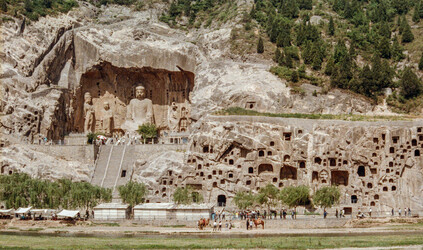
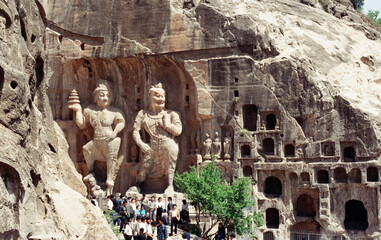
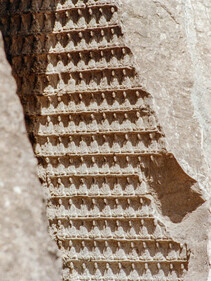
More Photos from Longmen and Luoyang
(May 17, 1991) XI'AN
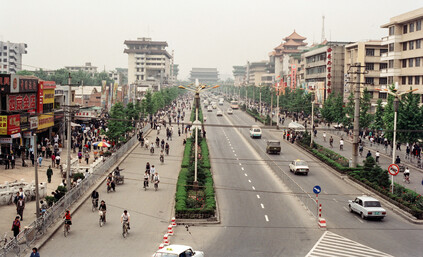
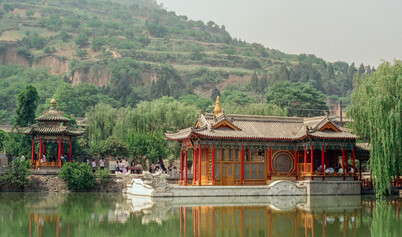
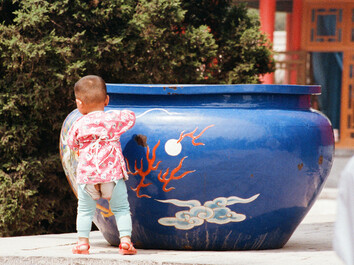
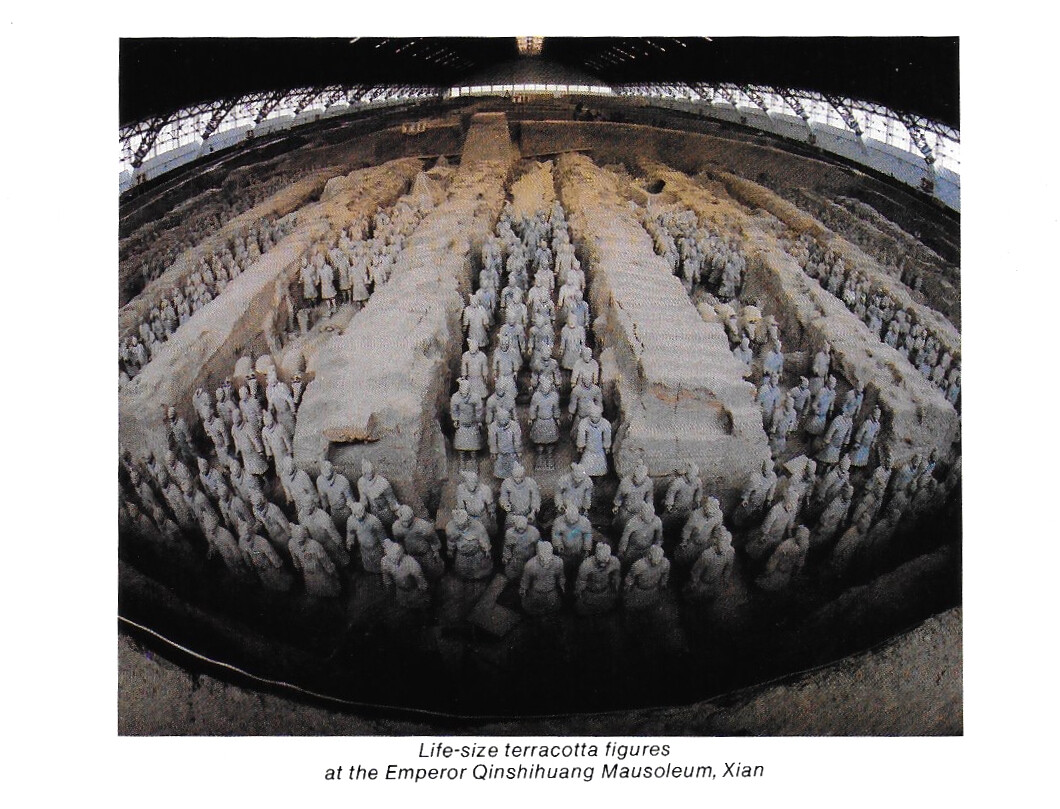
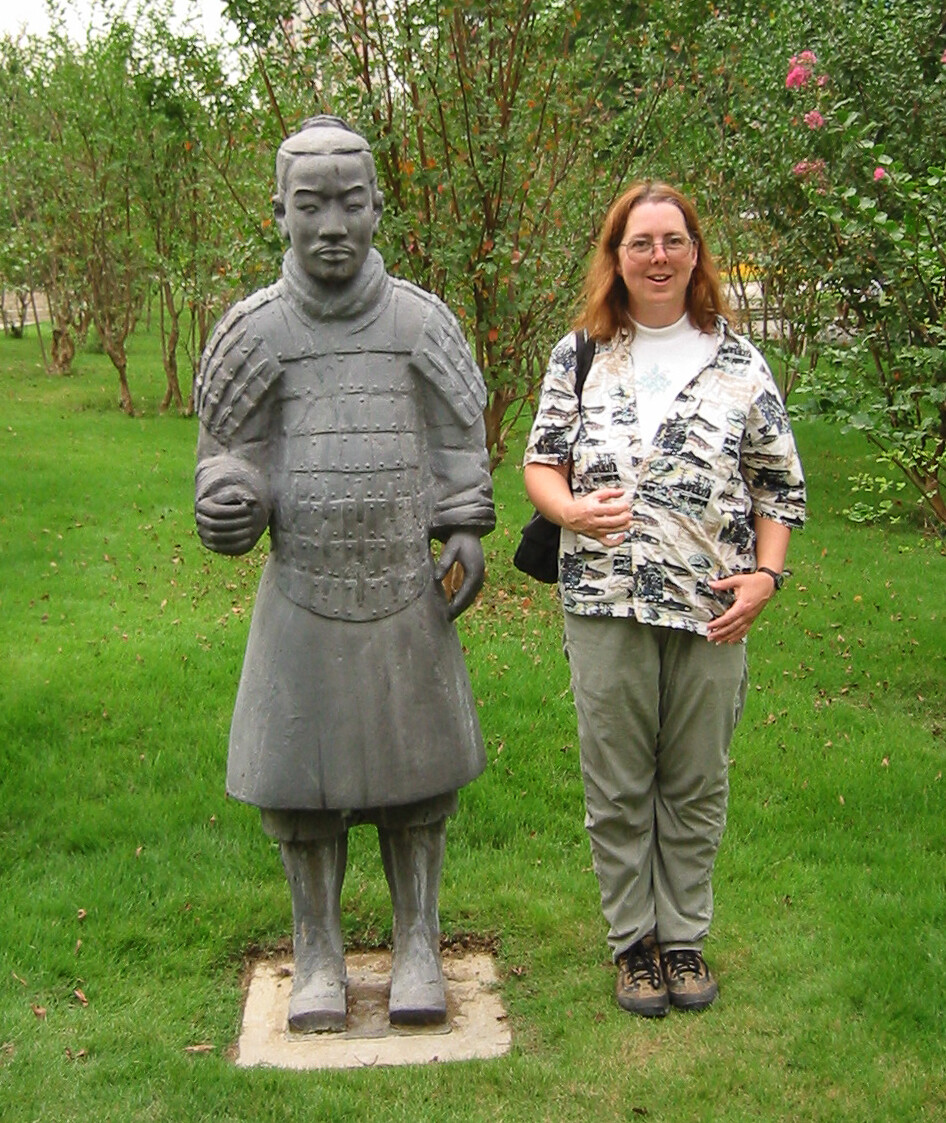
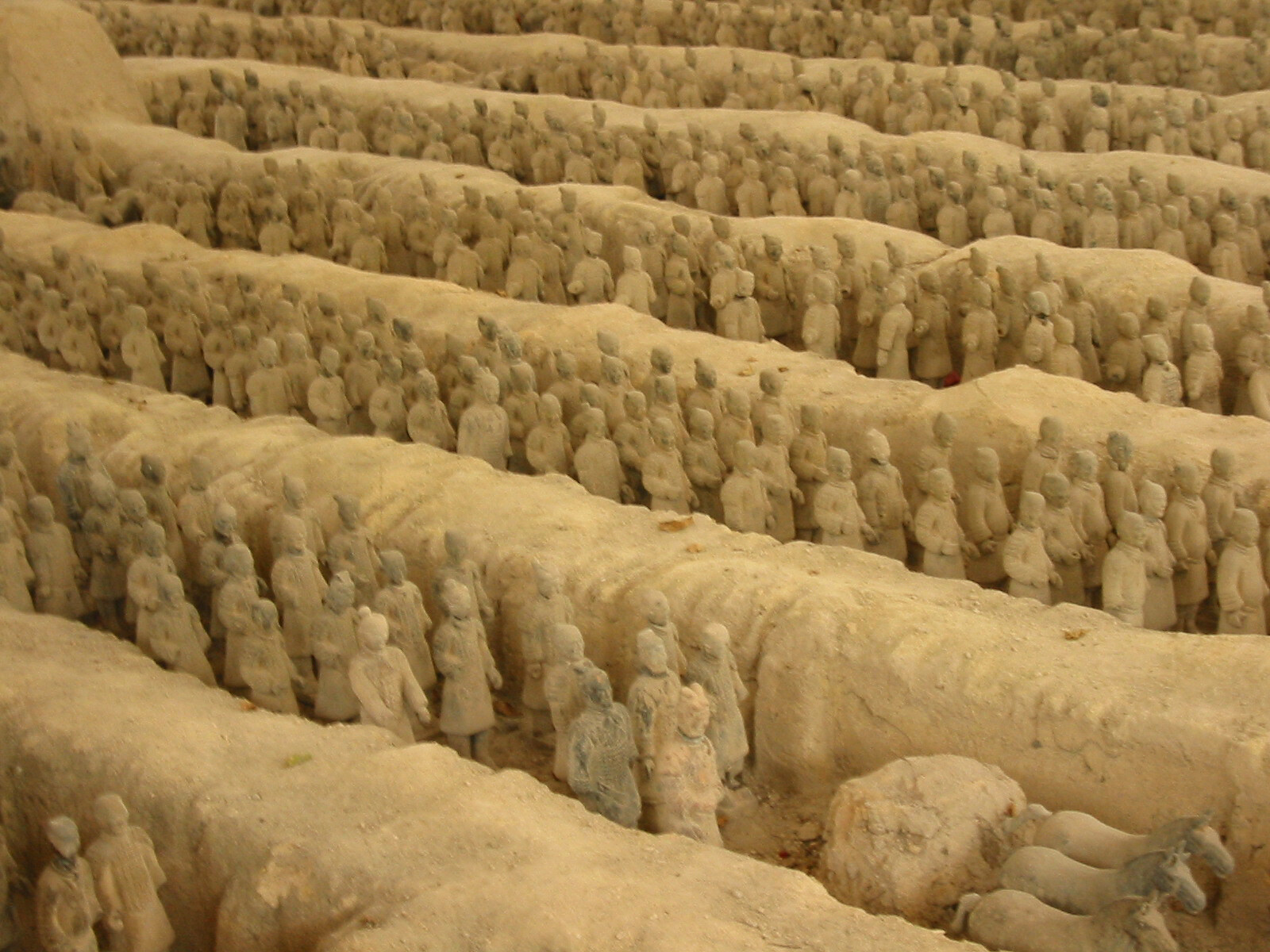
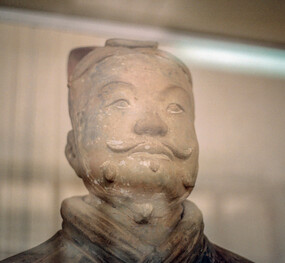
(May 18, 1991) XI'AN
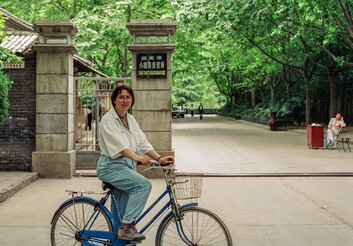
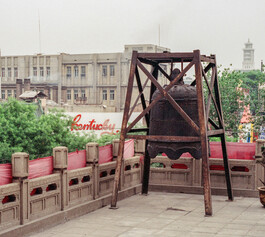
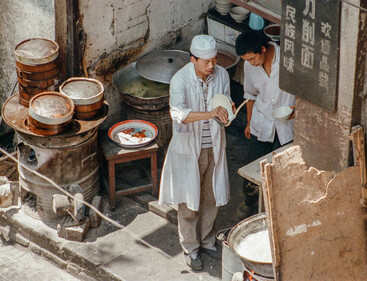
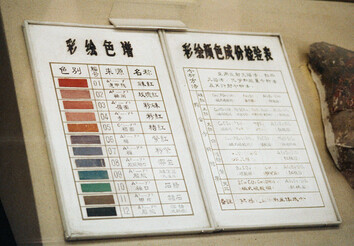
(May 19, 1991) XI'AN
More Photos from Xi'an
(May 20, 1991) XI'AN to LANZHOU
(May 21, 1991) LANZHOU
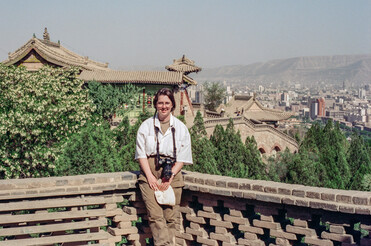
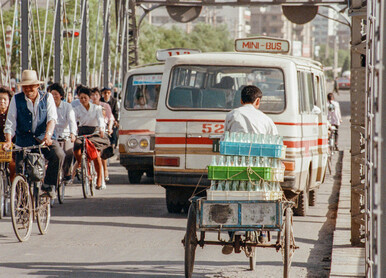
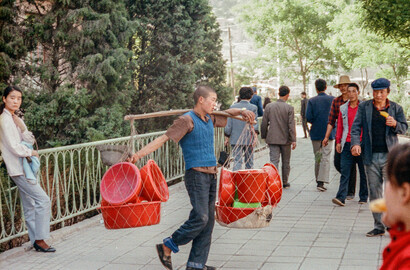
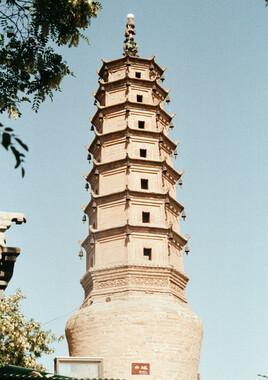
More Photos from Lanzhou
(May 22, 1991) TO JIAYUGUAN
(May 23, 1991) JIAYUGUAN
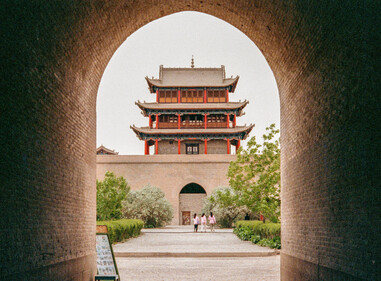
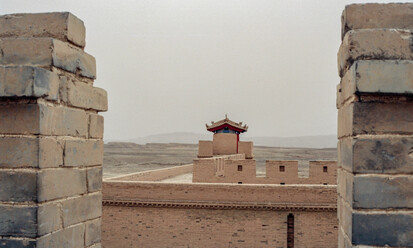
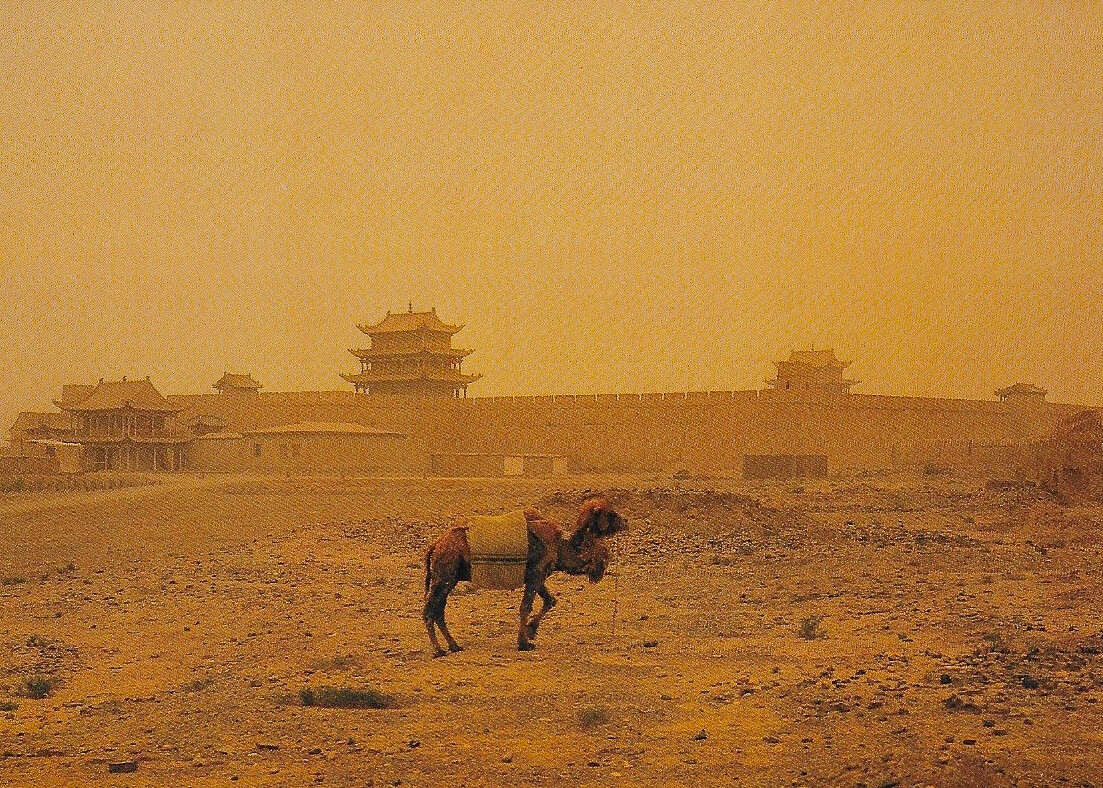
(continued - go to part 2)